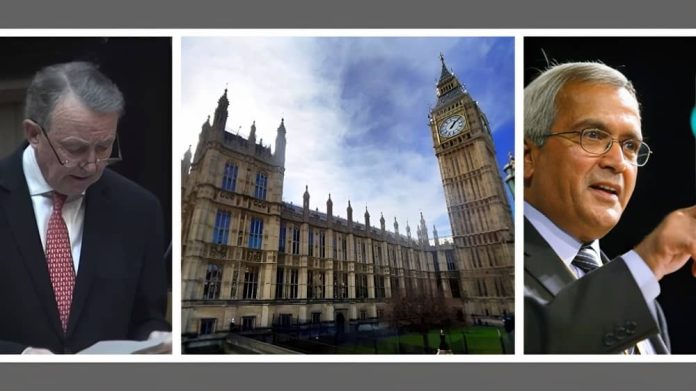Debate in UK House of Lords Raises the Need to Support Iran’s Revolution and Resistance, Proscribe IRGC

Written by
Shamsi Saadati
house of lords dholakia alton 1
On Thursday, February 23, a short debate on British-Iranian relations was held in the United Kingdom’s House of Lords at the initiative of Lord David Alton of Liverpool and in the presence of the country’s Minister of State, Foreign, Commonwealth, and Development Office, Lord Ahmad of Wimbledon. In this debate, several key issues were raised, including the designation of Iran’s Revolutionary Guards (IRGC) as a terrorist entity, the regime’s human rights abuses, and the need to support Iran’s democratic alternative to the ruling theocracy.
In his remarks, Lord Alton called out Tehran’s destabilizing activities, including its pursuit of a nuclear weapons program and the IRGC’s role in the war in Ukraine. Referring to the regime’s constant breaching of its commitments under the terms of 2015 nuclear deal-formally known as the Joint Comprehensive Plan of Action (JCPOA)- Lord Alton said: “In any event, why should we believe anything this regime says or promises? It told the world that its centrifuges could enrich uranium only to a 60% level of purity. As its total enrichment of uranium stockpiles now exceeds JCPOA limits by at least 18 times, it is patently clear that this is not a regime whose word counts for anything.”
Lord Alton also referred to Tehran’s human rights abuses dossier, particularly the 1988 massacre of 30,000 political prisoners and the ongoing executions in Iran. He also underlined that the majority of the 1988 massacre victims were members and supporters of the Mujahedin-e Khalq (MEK), which is Iran’s main opposition group and a member of the National Council of Resistance of Iran (NCRI), a collation of democratic forces led by president-elect Mrs. Maryam Rajavi.
The Ministry of Intelligence and the IRGC must be designated as terrorists, their agents must be prosecuted and deported, and their European citizenships must be revoked.#BlacklistIRGC pic.twitter.com/ZMntxUPNZc
— Maryam Rajavi (@Maryam_Rajavi) January 24, 2023
“It has long ranked among the world’s top executioners, often on the back of hasty sham trials. In 2021 it executed 314 people, 20% more than in 2020. Estimates differ for 2022, but dozens are facing protest-related executions,” Lord Alton said. “Not that we should be surprised, given the role of President Ebrahim Raisi in 1988 in the massacre of 30,000 political prisoners, predominantly from Mrs. Rajavi’s pro-democracy resistance.”
Among the speakers of Thursday’s debate was Lord Dholakia, who supported his colleague’s demand to proscribe the IRGC and support the Iranian Resistance. The United States Government classifies the Islamic Republic of Iran as the foremost state sponsor of terrorism, alleging that Iran provides a range of support, including finance, training, and equipment, to terrorist groups around the world. How else can we explain the use of Iranian drones in Ukraine or the security of some of the countries in the Middle East?” he said.
He also referred to and praised “the democratic revolution fully supported by the Iranian people.” “More than 750 people have been killed, according to the Iranian opposition People’s Mujaheddin Organisation of Iran. I have seen similar evidence of the attacks on resistance fighters in Camp Ashraf, where they had sought shelter. I have seen video evidence of the hanging of women and children on cranes in Tehran. There is one change in the protest marches that are now taking place: it is a revolution carried out mostly by Iranian women,” Lord Dholakia added.
He also supported Mrs. Rajavi’s ten-point plan for the future of Iran, “Democratic rule is perfectly possible in Iran. Mrs. Maryam Rajavi leads the pro-democracy Iranian opposition coalition, which has produced a 10-point plan and has widespread support in both Houses of the UK Parliament, as well as in Parliaments in many parts of the world. She mentions the rule of law and proper fair elections as essentials. Briefly, she talks of establishing a democratic, secular, and non-nuclear republic.”

